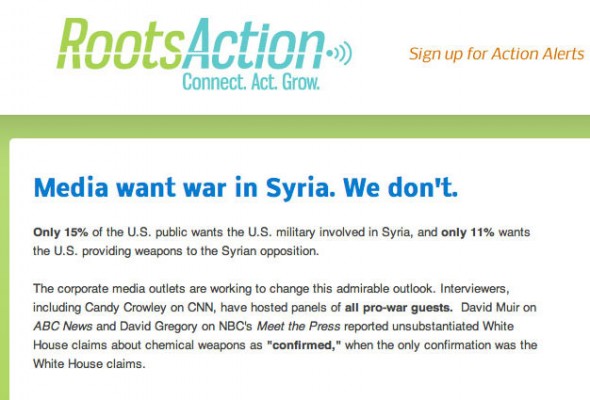by Ivana Braga
Friday 11 October, the 2013 Nobel Peace Prize will be announced. I’m wondering what are the chances of a journalist to be awarded? Usually when we ask about the media’s responsibility, the classic answer is a question: Is the window to blame for the landscape? And then, the discussion stops. However, when everybody is called to be part of peacebuilding, the media should be involved and take its place.
Graham Spencer, author of The media and peace: from Vietnam to the War and Gadi Wolfsfeld who wrote The News Media and Peace Processes – The Middle East and Northern Ireland, categorically say that the media is obsessive for conflict situations and violence. From the TVs guideline and newspapers’ front page, it is easily certified. In writing this post, I have searched for many examples of news culture in conflict situations, and this three-minute video about US and Syrian below illustrates it very well.
By the argument of audience’s taste, journalism in mainstream media has increased the level of sensationalism without questioning the impact of that in people’s minds and lives. As a result, the process of peace has less media coverage than violence. “World enemies” are more well know than leaders that work in peacebuilding. On the other hand, very often the media intensify political confrontation and summarize complex situations in “win-lose” terms.
For Spencer, one the roles of responsible journalism is to approach cultures, “contributes a deeper understanding of each so that judgments made about those culture and societies can be drawn on the basis of detailed information and interpretation.” Even the mainstream still is far of that; many people and groups are dedicated to questioning the media’s role, to producing their own information, to raising the awareness of the audience, and with the Internet, all of it can be made by citizens. Perhaps, these movements will show that peace also interests people, and change the news headlines.
Others sources:


I agree with you, that media has important, or even crucial role in peace building. I just hope that it reach its full potential in it.
Another interesting, thought-provoking contribution, Ivana. As mainstream media struggles in this area, I look forward to the revolutionary role of citizen journalism in the peace building process.
Your article made me remember the role of media during the Genocide in Rwanda and how it caused the escalation of violence through propaganda. You may find this article interesting: http://www.globalissues.org/article/405/media-propaganda-and-rwanda
Ivana,
In the American model of journalism the constant cry is for balance, objectivity and fairness. What risks do journalists experience in taking the side of peace – -at all costs? The answer, perhaps, lies within the reporter’s own personal boundaries between work (public life) and non-work (personal space). The lines always use to be so clear.
Study Murrow or Cronkite and one can see that even the great journalism icons of American history crossed the boundaries of what some call balance in order to take a stand and make their point.
Thank you for these pertinent observations.
Very good observations Evana and well ilustrated
Thank all for take time reading and reflecting about this topic.
Dr. Bill I don’t know if peace journalism is possible or if really need it, but I agree with Maja and truly believe that we can be part of the peacebuilding without be less professional ou tendentious.
Derya thank for the sources. Read it was so interesting.
Wahida and Rhonda thank you for the encouragement.
As mainstream media struggles in this area, I look forward to the revolutionary role of citizen journalism in the peace building process.